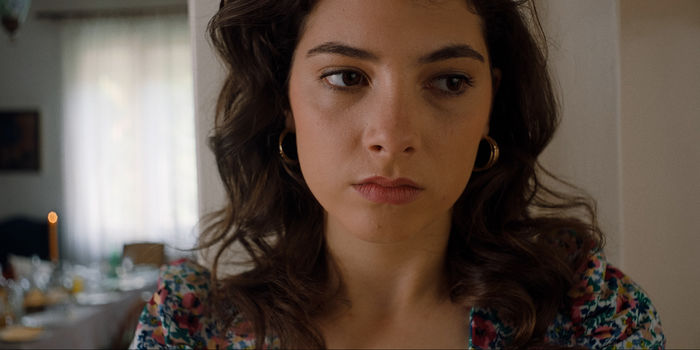Filming a faceless system
Director Michael Jobling on the “very common problem” erupting in our job centres

When I ask Michael Jobling about the inspiration for his recent emotionally compelling short film The Walk, starring Adeel Akhtar, I’m surprised to hear it started from a true story. “We (Michael and writer Sophie Ellerby) found an article in The Guardian about one guy who finds out he has to walk a 24 mile round-trip just to get to the nearest town and back, because his local bus route has been cut,” Michael tells me, “but it’s happening all over the country, it’s becoming a very common problem.” Akhtar plays Amar, whose laborious journey to and from the job centre is the focus of the film. His struggle is underpinned by the impending spectre of his father’s funeral. For Ellerby and Jobling, the core of the film is the real person behind the news story. “So often when you see these sorts of figures and statistics it’s presented purely as that, and it will often neglect the fact that these people probably have problems of their own.”
“You get small little victories, you hear the odd good story about it, but generally it’s a very faceless system”
The Walk presents these problems beautifully. With a runtime of just 11 minutes, the film still manages to masterfully hone in on Amar’s walk through the countryside as he is plagued by guilt, fear, grief, and exhaustion. The Walk makes excellent use of tight close-ups and rapid cuts to illustrate this: “what I wanted to really focus on was the fact that he’s been effectively marooned because of the bus route being cut, and not only is he physically distant from people, but his own depression and perception of the world feeds into how he interacts with people as well, which is why any person you see in the film sort of remains faceless,” Michael explains as he outlines decisions on cinematography which the team took. In collaboration with the DoP Jermaine Edwards, Michael wanted the camera to act as a “companion” to Amar, but also an “oppressive, almost annoying bluebottle that you can’t get rid of”, which feeds into creating Amar’s personal perception of the world.

Shot on 35mm film stock, The Walk is visually stunning, but Michael describes the process as “kind of terrifying”. “When you’re shooting on film you have to be really focused because you’ve only got a finite amount.” But the limitations also presented a creative opportunity: “that focus was kind of infectious, every time we called action you could feel the tension from the crew, and it raised the stakes a little bit.” Unlike shooting on digital cameras, film is “more tangible”, and Michael’s confidence in choosing to commit to that daunting decision is clear. “Jermaine and Anna (Griffin, producer) convinced me to take that leap. They said it would look absolutely beautiful and I agreed.” Watching the finished film, I’m certainly of the same opinion.
“It touches on society’s repeated failure to acknowledge the struggle of many of its people”
Michael tells me about the “open” ending of the film. “The beat we wanted to end on was that his problem isn’t solved, he’s still having to deal with the grief of his dad dying, he still hasn’t managed to call his brother back, he’s still got to go to the job centre, the bus route is still cut. On the surface it’s all exactly the same.” But Michael sees an optimism in the cathartis which Amar experiences on his walk home: “he’s been equipped with a new tool, even if it’s just helping him through that particular day.” The silent struggle experienced by many people like Amar forms part of a wider societal issue which Michael and the team continued to come back to during the process of making the film. “It’s about someone who can’t talk to someone to express his needs, even if he wanted to shout them out and tell people there’d be no one there to hear it. I think that speaks to the job centre and benefit system; you get small little victories, you hear the odd good story about it but generally it’s a very faceless system.”
The film ends with a Sikh proverb: “no one asks about the broken branch”. Michael tells me that Harpal Hayer – the voice of Amar’s brother – told the team about it. “He’s helped us a lot with better understanding the process of death in Sikh culture, and what’s expected of the eldest son.” Michael sees the proverb as extending beyond Sikh culture and resonating with modern Britain. “We had a tendency to keep relating it to what’s been going on lately with austerity and it just struck a chord with us; it touches on society’s repeated failure to acknowledge the struggle of many of its people.” Working freelance to teach filmmaking to young people, Michael has come to see film as “more than just escapism, as a necessity”, and Amar’s story as shown in The Walk is just one such story which deserves to be told.
 News / Cambridge student numbers fall amid nationwide decline14 April 2025
News / Cambridge student numbers fall amid nationwide decline14 April 2025 News / Greenwich House occupiers miss deadline to respond to University legal action15 April 2025
News / Greenwich House occupiers miss deadline to respond to University legal action15 April 2025 Comment / The Cambridge workload prioritises quantity over quality 16 April 2025
Comment / The Cambridge workload prioritises quantity over quality 16 April 2025 Features / The TikTok college: using social media in access and outreach15 April 2025
Features / The TikTok college: using social media in access and outreach15 April 2025 Sport / Cambridge celebrate clean sweep at Boat Race 202514 April 2025
Sport / Cambridge celebrate clean sweep at Boat Race 202514 April 2025






